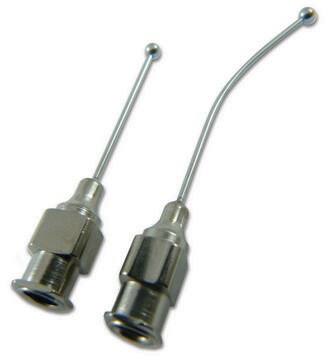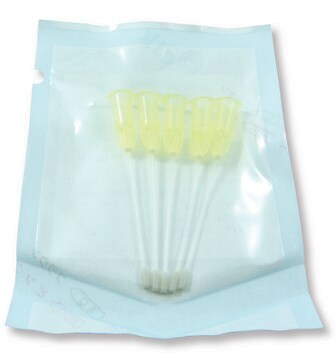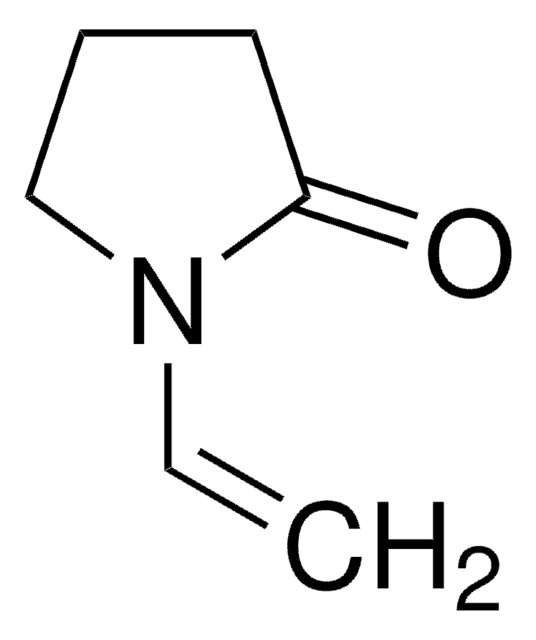91129
Trichloroethylene
puriss. p.a., ≥99.5% (GC)
Synonyme(s) :
TCE, Trichloroéthène
About This Item
Produits recommandés
Densité de vapeur
4.5 (vs air)
Pression de vapeur
61 mmHg ( 20 °C)
Qualité
puriss. p.a.
Essai
≥99.5% (GC)
Forme
liquid
Température d'inflammation spontanée
770 °F
Contient
(stabilized)
Impuretés
free halogens, in accordance
≤0.001% free acid (as HCl)
≤0.005% free alkali (as NaOH)
≤0.01% water
Résidus d'évap.
≤0.001%
Indice de réfraction
n20/D 1.476 (lit.)
n20/D 1.477
pb
86.7 °C (lit.)
Pf
−84.8 °C (lit.)
Densité
1.463 g/mL at 25 °C (lit.)
Traces de cations
Al: ≤0.5 mg/kg
Ba: ≤0.1 mg/kg
Bi: ≤0.1 mg/kg
Ca: ≤0.5 mg/kg
Cd: ≤0.05 mg/kg
Co: ≤0.02 mg/kg
Cr: ≤0.02 mg/kg
Cu: ≤0.02 mg/kg
Fe: ≤0.1 mg/kg
K: ≤0.5 mg/kg
Li: ≤0.1 mg/kg
Mg: ≤0.1 mg/kg
Mn: ≤0.02 mg/kg
Mo: ≤0.1 mg/kg
Na: ≤0.5 mg/kg
Ni: ≤0.02 mg/kg
Pb: ≤0.1 mg/kg
Sr: ≤0.1 mg/kg
Zn: ≤0.1 mg/kg
Chaîne SMILES
Cl\C=C(\Cl)Cl
InChI
1S/C2HCl3/c3-1-2(4)5/h1H
Clé InChI
XSTXAVWGXDQKEL-UHFFFAOYSA-N
Vous recherchez des produits similaires ? Visite Guide de comparaison des produits
Description générale
Application
Mention d'avertissement
Danger
Mentions de danger
Conseils de prudence
Classification des risques
Aquatic Chronic 3 - Carc. 1B - Eye Irrit. 2 - Muta. 2 - Skin Irrit. 2 - Skin Sens. 1B - STOT SE 3
Organes cibles
Central nervous system
Code de la classe de stockage
6.1D - Non-combustible acute toxic Cat.3 / toxic hazardous materials or hazardous materials causing chronic effects
Classe de danger pour l'eau (WGK)
WGK 3
Point d'éclair (°F)
closed cup - does not flash
Point d'éclair (°C)
closed cup - does not flash
Faites votre choix parmi les versions les plus récentes :
Certificats d'analyse (COA)
Vous ne trouvez pas la bonne version ?
Si vous avez besoin d'une version particulière, vous pouvez rechercher un certificat spécifique par le numéro de lot.
Déjà en possession de ce produit ?
Retrouvez la documentation relative aux produits que vous avez récemment achetés dans la Bibliothèque de documents.
Les clients ont également consulté
Notre équipe de scientifiques dispose d'une expérience dans tous les secteurs de la recherche, notamment en sciences de la vie, science des matériaux, synthèse chimique, chromatographie, analyse et dans de nombreux autres domaines..
Contacter notre Service technique








